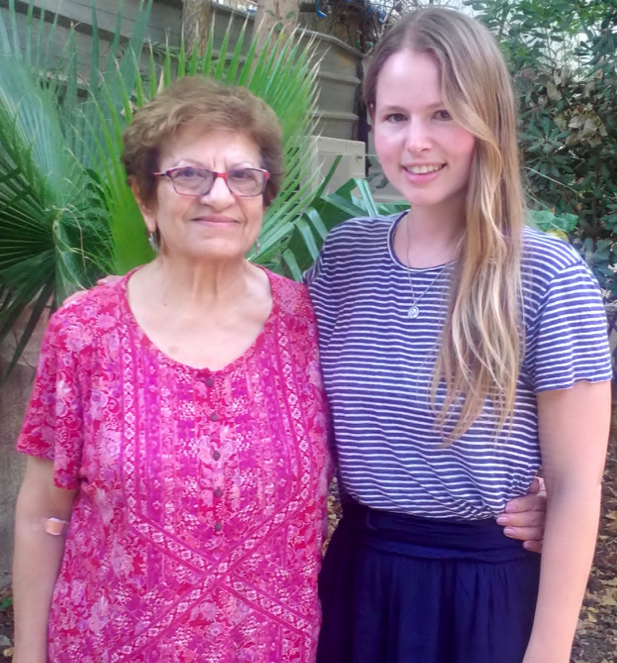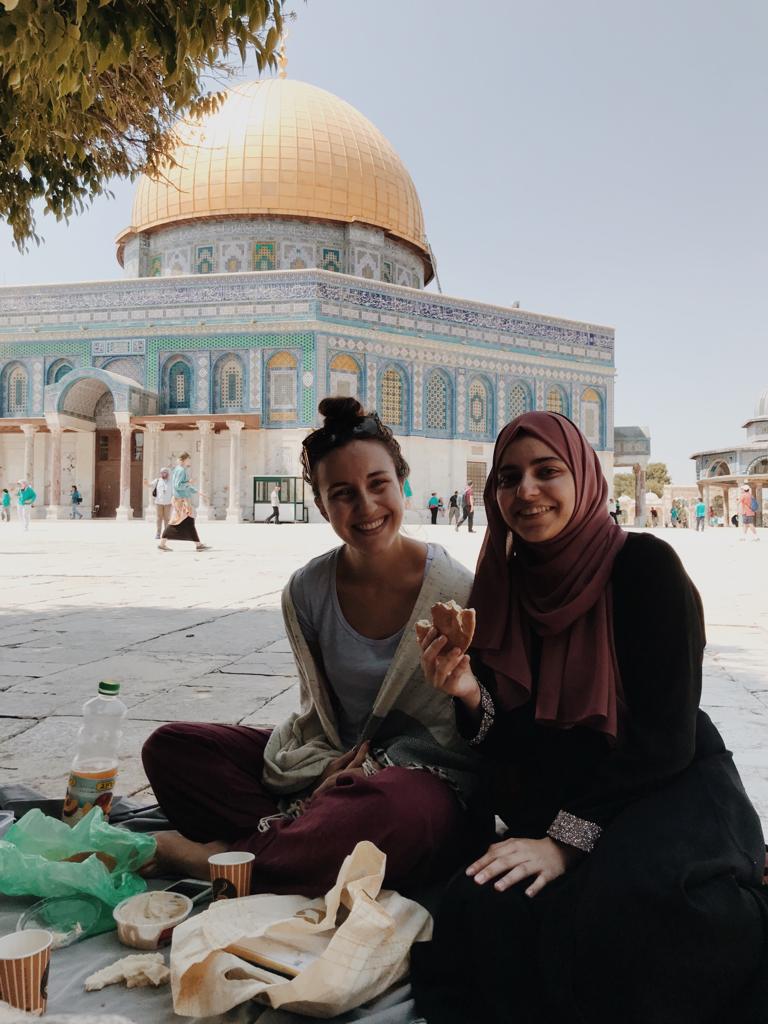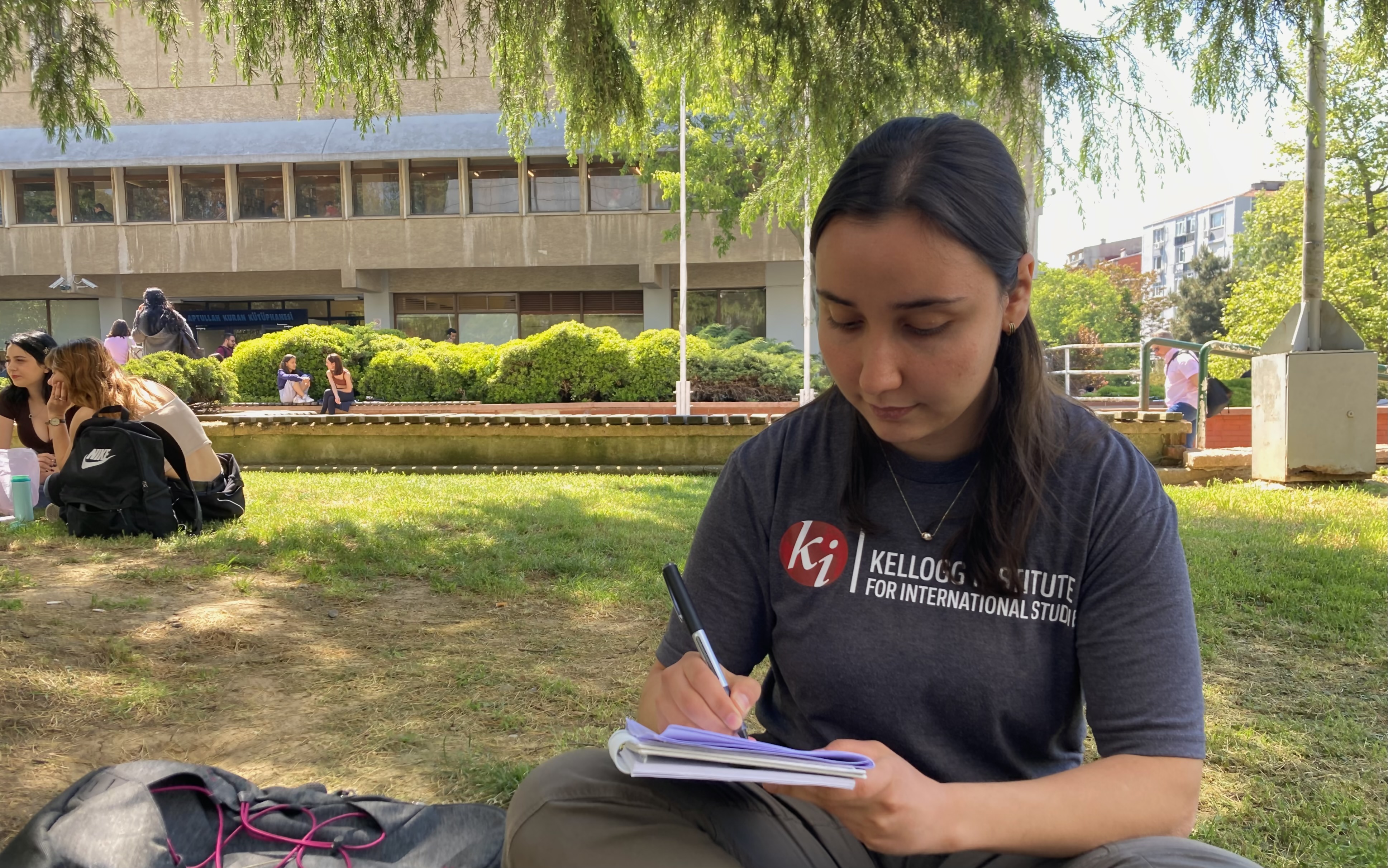When moral theologian Marie-Claire Klassen first visited Sabeel, a liberation theology center in East Jerusalem, she was impressed by the faith commitment of Palestinian Christians who contemplate the Gospel message through the lens of what it means to live under occupation.
 “There’s a clear identification with the marginalized and oppressed,” says the University of Notre Dame doctoral candidate and current Kellogg Institute Dissertation Year Fellow. “When I went there for the first time in 2015, I was so struck by what they were doing that when I got into my doctoral program, I wanted to focus on Palestinian liberation theology.”
“There’s a clear identification with the marginalized and oppressed,” says the University of Notre Dame doctoral candidate and current Kellogg Institute Dissertation Year Fellow. “When I went there for the first time in 2015, I was so struck by what they were doing that when I got into my doctoral program, I wanted to focus on Palestinian liberation theology.”
That’s meant asking new and often difficult questions in the Middle East, where Klassen is one of four scholars who have received Kellogg Doctoral Research Grants to conduct field research in Israel and Palestine.
“Marie-Claire is a theologian, Hannah Early Bagdanov is a political scientist, Alyssa Paylor is an anthropologist,” says Anna Johnson, a sociologist with peace studies expertise who’s working in Bethlehem. “The disciplines are very different but our understanding of the context allows us to ask questions of each other that we've all felt really useful.”
They’re joined by Sehrazat Mart, a political sociologist working in Turkey with doctoral research support from Kellogg.
Together, they’ve nurtured a community of female scholars whose shared interests span across their respective academic disciplines.
Johnson studies the ways in which tourism in Palestine/Israel can help people to meet Palestinians and amplify Palestinian voices, dispelling the stereotypes and disrupting the violent narrative about Palestinians that’s common to Western discourse.
“I was fortunate that Marie-Claire and Hannah had already been in Jerusalem conducting their research before I arrived,” says Johnson. “I was able to ask questions of them that ranged from the logistics of apartment searches and nearby grocery stores, to insights into research in this complex setting.”
 The opportunity to complete their Middle East field research presented a number of challenges beyond the academic, whether in terms of practical advice about travel and security, or cultural nuances when connecting with communities. Still, Early Bagdanov notes there are many “shop talk” questions about who to recommend as a language translator, or how best to compensate a research assistant.
The opportunity to complete their Middle East field research presented a number of challenges beyond the academic, whether in terms of practical advice about travel and security, or cultural nuances when connecting with communities. Still, Early Bagdanov notes there are many “shop talk” questions about who to recommend as a language translator, or how best to compensate a research assistant.
She studies the ways in which Palestinians choose to interact with the Israeli state when seeking basic services, like trash pickup or health care, in walled-off East Jerusalem. She’s lived at the university’s Tantur Ecumenical Institute while evaluating engagement with state power that’s perceived as illegitimate.
“Anna and I were lucky to overlap for about five months of field research, and during that time we could be sounding boards for each other in big and small ways,” says Early Bagdanov. “It wasn't uncommon to leave each other voice memos, or send quick texts or meet for a meal.”
Mart wasn’t in the same country as she pursued research on political activism in Turkey and how engagement has been shaped by intergenerational experience. Yet she was in the same time zone, meeting up during Zoom co-working sessions to share her observations or work on fellowship applications together.
The Middle East scholars say they’ve benefited from the connections and camaraderie in terms of emotional support, but the work itself delivers its own rewards.
 "There were indeed moments during fieldwork when the levels of social conflict and instability in Turkey affected my experience," said Mart. "But they weren't the defining characteristics of my research experience. For me, and I know for other Kellogg folks working in the Middle East, there is also so much joy and community in research."
"There were indeed moments during fieldwork when the levels of social conflict and instability in Turkey affected my experience," said Mart. "But they weren't the defining characteristics of my research experience. For me, and I know for other Kellogg folks working in the Middle East, there is also so much joy and community in research."
Klassen says she appreciates having a network of like-minded colleagues that she can meet or text, which she finds essential to avoiding burnout.
“I have turned to Anna, Allyssa and Hannah for advice with practical things, like the best mode of transport between cities in the West Bank,” she says, “as well as for support when I have had to navigate a challenging moment in the field.”
Whether aided by Kellogg Faculty Fellow Fr. Emmanuel Katongole, a professor of theology and peace studies who helped Klassen develop her research methodology, or associate professor of sociology and peace studies Ann Mische, also a faculty fellow and Mart’s dissertation committee chair, the Kellogg-supported scholars are committed to thoughtful inquiry that delivers new insights and extends beyond their respective areas of expertise.
“Because some recognize Kellogg’s historical strength in Latin America and increasing commitments in Africa, it might be a surprise to learn that we’re funding research in the Middle East,” said Associate Director Denise Wright, who coordinates the Institute’s graduate student programming. “But Kellogg’s research agenda transcends geographic boundaries – we seek to promote scholarship on international human development and democracy wherever in the world our fellows and affiliates conduct research.”
“The strengths of a space like Kellogg are in bringing together different disciplines to have conversations,” says Johnson, who hopes to form a Middle East working group with her colleagues.





